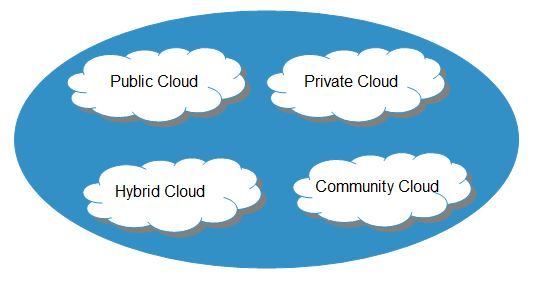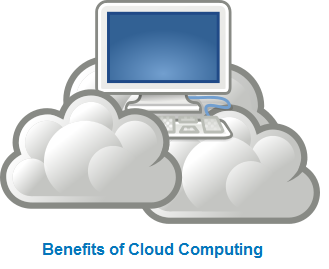Advantages of different Cloud Computing Models
Cloud Computing is a growing concept in web world and offers dynamic virtual resources, high bandwidth, and on-demand software. According to KPMG survey, it is believed that 81% of businesses have adopted cloud services. There were only one out of 10 individual said that they have no emergency of adopting cloud service. However, one thing is sure that businesses are moving to the cloud. There are three different aspects of a cloud service: Application, Storage, Connectivity, and every part are designed to serve a different function. Which type of cloud is suitable for your business can be decided upon several factors like business criticality of applications, regulatory issues, service levels, usage patterns for workload, and application integration.
On the above factors, we would like to make you aware of the types of cloud computing services designed for a different purposes.
Types of Cloud:
Cloud Service also relies on the structure of enterprise and location. When an organization wishes to take cloud services, there are four types of cloud services available like public cloud, private cloud, hybrid cloud, and community cloud. Let us go through each type of cloud service.

Public Cloud:
Public cloud system means a cloud service that is publically available where resources, web applications, web services are furnished over the web, so any user can use the data or information from the cloud. Establishments do not have to obtain personal cloud storage; they can amass their information and backup on the third-party cloud storage. Sometimes they take charge for premium service otherwise available at free of cost. Amazon, Google, and Microsoft have built their own infrastructure and accessible via the internet. It provides benefits like low-cost setup, pay per use, scalability, and no waste of resources. Public cloud provides suppleness, an easy approach, an influential platform, and a dependable solution for a lifetime. Public cloud is transparent to users, so there is a chance of a potential threat to the security of the system.
Private Cloud:
Private cloud offers service within an organization’s boundary and is accessible for a single selected organization. Users outside the organization cannot retrieve the data. A private cloud rests at the customer’s location and provides customers extra control over the infrastructure. Besides, the enterprise can have control on the organization’s data, security instructions, and system performance. It furnishes superb performance that is available at low-priced and offers the liberty to make use of applications on selected cloud. The service involves a significant functioning level and allows on-demand capability where an organization can add more services.
Hybrid Cloud:
It is a mixture of public and private cloud. An organization keeps its important data on private cloud storage and the rest data remain on public cloud storage. Due to the use of private and public cloud storage, users can save costs. It is also called multiple cloud system that allows data to be transferred from one system to another system. Most organizations apply the Hybrid cloud in daily business operations. Organizations are allowed to keep every aspect of their business in the most possible and different environment but they have to track multiple security platforms to ensure that all business aspects communicate with each other in a secure environment.
Community Cloud:
A community cloud is a mixture of public, private, and hybrid clouds and it is shared by multiple organizations with common computing concerns like security, policy compliance, and jurisdiction. The community cloud can be handled externally, third party or on the in-house environment. The cost of a community cloud is higher than the private cloud but lesser than the public cloud. This type of cloud computing is the best solution for businesses and organizations that work on joint projects with a view to achieving a common goal. In short, the community cloud refers to sharing infrastructure between multiple organizations to work on a common goal.
Advantages of Cloud Computing:
Cloud Computing furnishes a scalable and flexible environment to manage the increased work volume without affecting system performance. Before reaching to any conclusion about choosing cloud service, you should have to consider few advantages associated with cloud computing. We have described Cloud Computing advantages as under:

- Lower Capital Cost: It is the most efficient medium to storage the information, as it is easy to update and maintain the cloud platform. If you have traditional desktop software, it will cost you a lot because it requires multiple users license fees. On other hand, cloud services can lower the IT expenses. Organizations can meet the specific service demands while paying only for utilized service resources. Single payment service and pay as you go service are some reliable options that can reduce the company’s IT expenses.
- Infinite Storage with Easy Backup: Cloud provides you enough space for your information and data. There is nothing to worry about insufficient space or augmenting current storage space. All your data is stored in the cloud so backup and restoration of data become easy compare to storing data on a physical device. Cloud providers can handle the data restore and data backup smoothly.
- Software Integration: Software integration is much simpler that the user does not need to take additional efforts to adapt and integrate applications as per requirements. Users can choose the applications that are best suitable for the enterprise. Even cloud providers take care of software updates so users do not need to spend time in patching software or applications.
- Deployment: Cloud carries quick deployment. Your whole system can be entirely operable in a few minutes. The amount of time will depend on the technology that a user chooses. A trouble-free deployment process saves user’s in-house installation and maintenance cost.
- Collaboration: Through Cloud Computing, sharing and communication become easy. If a user works on a single project than he/she can share files with employees, contractors, and third parties. A user can choose a type of cloud service that makes easy for him to share documents and data across different locations. An employee can synchronize, work and share apps at the same time.
Conclusion:
Numerous Advantages and features like flexibility, anytime accessible, diversity makes cloud computing dearer in organizations. The above advantages and different cloud types offer a dependable solution to the business. Cloud services seem beneficial to small and medium businesses and have offered a cost-effective option instead of costly traditional desktop software.


